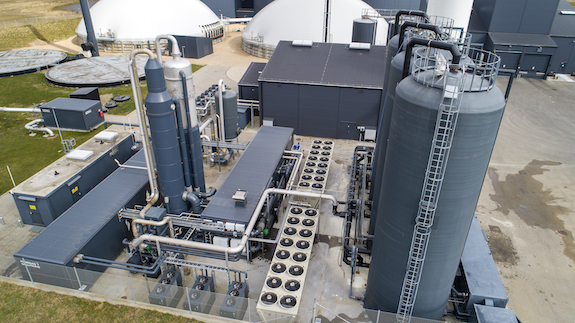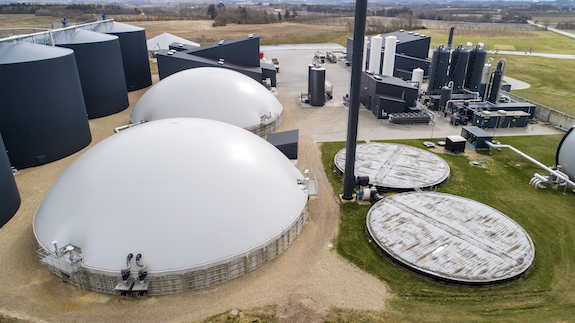The Biogas yield explosion: Nature Energy’s 66% higher yields, 3 new US projects and a new US CEO

In the days around the global financial crisis of 2008-09 when so many eyes were glued to the television watching the cable financial networks like Bloomberg and Fox Business, the 9am Morning Call program at Fox was so frenzied as the storylines expanded, that you might have mistaken it for the frenzy of the US biomethane business of 2022.
The biogas frenzy of course is a happier story. It seems every company in the world has discovered the virtues of decarbonization but few have mastered the logistics, global footprint, capital and technology to convert reams of daily and agricultural waste to replace fossil fuels in our gas pipelines. Glory be.
It may then come as little surprise that when the world’s largest producer of biogas energy in the world, Nature Energy, took aim at the US market, they tapped former Fox Business vice-president and Morning Call anchor Alexis Glick to head up operations.
Media folk are rarely tapped to head major energy companies, so a word of explanation might help. In recent years, Glick has been CEO of GENYOUth, where she built and led the largest public-private partnership in support of better youth nutrition. Among the bedrock supporters: the NFL and the dairy industry. So, managing partnerships with big brands and communicating with farmers — skills in the wheelhouse already.
Let’s spend a minute today looking at biogas markets and technologies — and also the dudes from Denmark, Nature Energy. What they bring to the table. Turns out, a lot.
The biomethane rationale

Nature Energy Korskro, Korskro. photo: Claus Haagensen
The biomethane business — referred to as biogas when used on-farm and renewable natural gas when cleaned up and injected into the US gas pipeline system — has been the rock-star of the renewables industry and movement if we measure by progress on tough objectives. Decarbonizing transport and agriculture is the Omaha Beach of climate change — the must-have objective, the toughest struggle, yards count, inches matter.
Life would be easier if every company had the expertise and efficiencies that come from a big project portfolio, mature technology and a focus on the H2Cs — the hard-to-decarbonize sectors like ag and transport.
Real world, many companies have achieved two of those. They have mature technology and work on the H2Cs, but don’t yet have scale. Or, they have lots of projects in development and work on the hard-to-decarbonize, but the technology is still maturing. Most often, we see companies with mature technologies and lots of projects — think solar or wind — that work on the easy-to-decarbonize stationary power sector.
So, what’s the Nature Energy competitive edge?
First of all, scale and experience. In addition to the upcoming US projects (Roberts, Wisconsin; Wilson, Minnesota; and Benson, Minnesota), the company owns and operates 12 biogas plants in Denmark and one in each of the Netherlands and France. The company has acquired land to build biogas plants at three sites in Quebec: Farnham, Louisville, and Saint-Joseph de Beauce, Quebec.

Nature Energy Korskro, Korskro. Photo: Claus Haagensen
Second, mature technology. As Alexis Glick told The Digest, “We talk so often about the Circular economy. Here’s a company that has figured out the products. Things like eliminating the odors, producing food-grade CO2 for beverages and other solutions, getting methane yields that are 66% better. Here’s a company ready to be the leader in biogas 2.0.”
Farmers and their goals
In the end, it’s about manure management. Used well, a powerful soil amendment and a source of on-farm energy. At worst, an odious source of GHGs. To build a solution, you need a village,. In this case, technology and operations, to start. That’s Nature Energy. Then, partnerships with North America’s dairy farmers, large scale food and industrial companies, and help support the rapid adoption of clean biogas fuels.
Glick told the Digest, “100 percent, what drew me was the farmer. They really understand what are the headwinds to their freedom and right to operate. They really want to get into the sustainability game. That’s where we can be part of the solution. We [bring a project] that reduces greenhouse gas emissions, and gives them a better than conventional fertilizer product.”
Next steps
Glick told us, the focus is on getting the shovels into the ground at the three projects in Wisconsin and Minnesota. It’s time to operationalize the plants that have been identified, Glick told us.
Reaction from Nature Energy
Ole Hvelplund, president and CEO of Nature Energy said: “The addition of Alexis to our senior management team brings an extraordinary mix of operations, technology transformation and management experience to advance our goal of leading the Biogas 2.0 movement and enhancing a circular economy for sustainable agriculture. Leveraging her existing connections and relationships with public and private leaders at the highest level, Alexis will lead our North American expansion while educating policy makers, farmers and customers in the U.S. and Canada on the benefits of biomethane. We are excited about our collective development pipeline and the opportunities ahead to increase adoption of biomethane as a renewable power source that advances the global energy transition.
Category: Top Stories















